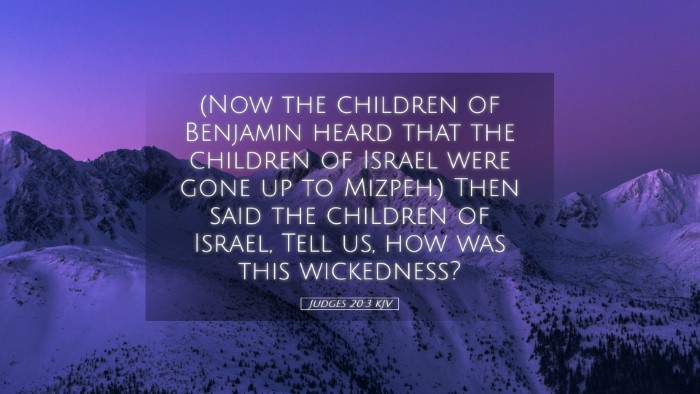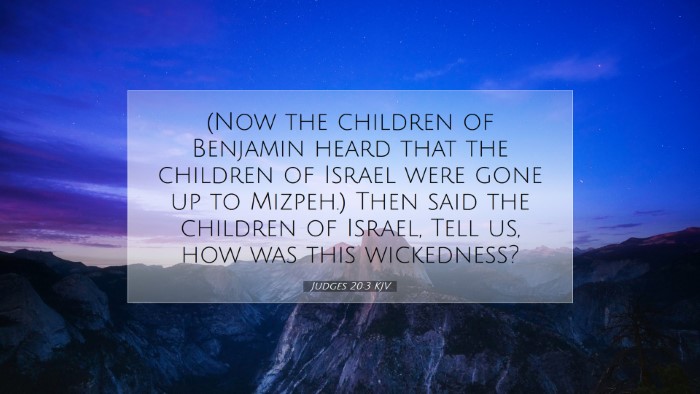Bible Commentary on Judges 20:3
Verse Overview: Judges 20:3 presents a profound moment in Israel's history, a time marked by civil strife and moral decay. The verse reads:
"Now the children of Benjamin heard that the children of Israel had gone up to Mizpah. Then the children of Israel said, 'Tell us, how did this wickedness happen?'" (Judges 20:3, NKJV)
Contextual Background
This passage comes in the aftermath of a horrific crime committed in Gibeah, a city within the territory of Benjamin. A Levite's concubine was abused and died, prompting the Levite to summon the tribes of Israel to seek justice. The complexities of tribal loyalty and justice are apparent throughout this narrative.
Summarized Insights from Public Domain Commentaries
1. Historical Context (Matthew Henry)
Matthew Henry emphasizes the gravity of the situation that led to this assembly. The Levite's story represents not just an individual tragedy but a microcosm of Israel’s moral decline. Henry notes that the Levite's decision to divide the body of his concubine and send it to the twelve tribes served as a shocking wake-up call—an appeal to the national conscience of Israel.
2. The Collective Responsibility (Albert Barnes)
Albert Barnes elaborates on how the tribes of Israel convened, underscoring their sense of collective responsibility. The question posed by the Israelites, "How did this wickedness happen?" serves as a reflective inquiry into both the immediate circumstances and the broader societal failures. Barnes posits that this moment marks a turning point where the Israelites begin to grapple with the consequences of their deteriorating moral standards.
3. Theological Implications (Adam Clarke)
Adam Clarke draws attention to the theological implications of the gathering at Mizpah. He argues that this was not merely a human endeavor to seek vengeance but a moment to invoke God's justice. Clarke points out that the Israelites' initial step in seeking the Lord’s guidance through their assembly indicates a desire to rectify the injustices of their land.
Moral and Ethical Reflections
The conversation prompted by this verse opens the floor to deep moral inquiries about justice, community, and responsibility. Pastoral leaders and theologians are called to reflect on the following:
- The Nature of Evil: Recognizing that evil is often systemic rather than isolated and requires community accountability.
- Response to Injustice: Understanding that the collective response to a crime can reveal the health of a community — whether the response is one that seeks restoration or revenge.
- The Role of Leaders: The necessity for leaders within the Church to guide congregations toward righteousness and truth.
Practical Applications for Today
Judges 20:3 serves as a reminder of the importance of confronting wrongdoings within communities, whether they are ecclesiastical or societal. Like the children of Israel, we must not shy away from tough questions regarding our moral compass.
- Encouraging Dialogue: Pastors and community leaders should foster environments where difficult conversations about morality and justice can occur.
- Promotion of Justice: The Church is called to be a voice for the oppressed and to actively pursue justice in both spiritual and social realms.
- Community Engagement: Engaging with culture and society critically, reflecting the values of justice and righteousness that come from Scripture.
Conclusion
Judges 20:3, with its layers of historical significance and moral urgency, invites reflection and action. It emphasizes that the cry for justice and reflection on communal guilt remain as relevant today as they were in the days of the Judges. By embodying a spirit of accountability, the Church can contribute to healing and restoration in a fractured world.


